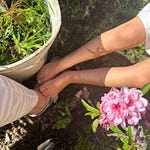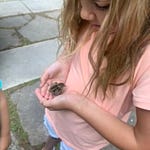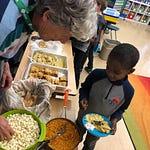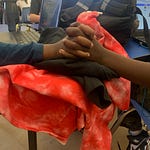A couple of neighbors and I had recently finished Richard Powers, Bewildered, and were, well, quite bewildered. Tom built a fire in the pit out back, Malia came with tea and whiskey, and we gathered under the stars to hash it out.
The conversation wound round and round, as all good ones do–helped along by the primordial calming of the flames and the absence of screens or time limits. Just three humans living in a broken world, trying to figure out what Powers was saying about that. Why all the dead mothers in his novels? Why all the disconnected dads? Are the alternate planets in Bewildered supposed to represent a kind of hope or a deadly distraction?
But the question that has stuck with me from that conversation most profoundly is this: what do kids today need in order to navigate this planet on the brink of so much?
It’s easy to jump to some kind of junior prepper scenario. We must teach our kids how to survive when systems collapse–to build bunkers and hoard resources and survive at all costs. I recently put together an earthquake kit for our house and my five-year-old kept trying to sneak stuffed animals in. She’s not wrong. If we train our children to be expert survivalists, they might be alive, sure, but who wants to emerge from an apocalypse alone?
For me, the answer is something more psychological and social. They need wisdom about limits–the planet’s and their own. In contrast to the impression they get from an Amazon package arriving 24 hours after Momma clicked the buy button on those jammie pants, they need to imagine how each object that comes into our house requires labor, materials, and gas for transportation. Amazon feels a bit extraterrestrial by design, as if these things that arrive at our doorstep didn’t originate on and of this earth.
And on the other end of a thing’s life–when the jammie pants reveal bony ankles, get holes, and wear out–they need to know that they don't just vanish into thin air. They maybe get a second life via Goodwill if we’re lucky; many times not even that. They remain here, on this planet–the tiniest, but not insignificant, addition to the weight she’s already bearing, the decomposition she’s already straining under.
So there’s this wisdom of limitation about resources and labor that I hope to give them–and am so far doing a very middling to poor job at, by the way–and then there is this wisdom of their own limitations. So much of parenting is about building your kid up, encouraging them to keep trying as they learn a hundred new things everyday.
But the truth is, they must also learn that they are limited. That they need other people. That they can’t always get what they want when they want it, and that’s a good thing, a spiritually aligned thing. That they will be bad at some things, uninterested in others, that they could never learn all the skills one needs to get through this broken world, so they must survive via friendships and community.
Perhaps the most endangered person walking into the future right now is the one who thinks they can go it alone, the one who carries the weight of believing they must be the best at all things, who forgets the pleasure of anticipation or the richness of relationship. And yet, so often, this is what our parenting and educating looks like–especially for those of us with privilege. So many of us are still training our kids to be excellent thinkers rather than whole, curious travel companions. Sometimes I worry that my youngest doesn’t have much academic inclination, or that my oldest likes audiobooks so much more than reading herself. Should we have been more rigorous? Emphasized different things? Made different rules?
But then I breathe and remember that if my kids are skilled at friendship (especially with kids who don’t look or talk or think or move like them), I will have done something very right. If they know how to find the helpers and the weirdos, if they know how to make eachother laugh as they repurpose cardboard boxes into spaceships, if they can get lost with other people in imaginary worlds where they are brave and resilient and delighted and sometimes wearing a tiara or a suit vest–well, that’s probably a lot like what the future holds.
Tom, who has been an educator his whole life and raised three beautiful boys, reminds us that the thing we most need to do is nothing. To know that we don’t know. Instead of feigning parental knowing, we must pay attention. Our kids will show us what muscles they need to grow, what mindsets they need to invent or reclaim, what survival skills they need to learn for the future they will live into, a future we can’t possibly imagine because our brains and hearts were formed at a time without fire seasons or cell phones. If the country seems unrecognizable to you right now, as I think it does for many of us, consider that there might be a signal in that and that it might not be all bad. We have old eyes, old ways of seeing gender and CO2, our desires and our dreams. They were born in this world at this time–a journey we can’t control and are not, in fact, expert in at all. So I suppose the question becomes, not what we can teach them so that they might survive, but what they can teach us, so that we can let go?












Share this post